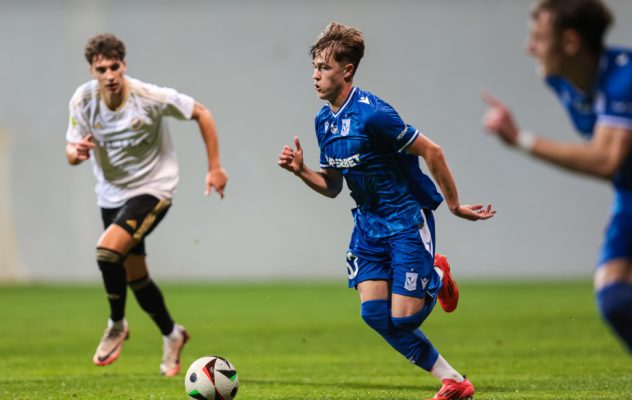



What became clear during the 2-day Talent Development Summit 2025 is that football’s data revolution has matured. Speaking from the vantage point of spearheading and understanding data science departments, it is no longer about collecting more numbers, but about creating meaning that directly informs player development and organizational decisions. Technologies and environments like the skills.lab Arena, showcased by several clubs throughout the summit, embody this evolution and bridge the gap between data and player development.
The overarching themes from a player development and performance point revolved around data-driven decision reviews, bias mitigation through structured observation and the design of data-informed training environments that balance structure with the freedom for players to take risks and learn.
Across clubs and academies, there was a clear emphasis on benchmarking, plan-do-review cycles and multi-source data integration to guide long-term talent strategies. Speakers consistently highlighted the need to balance quantitative insight with human judgment to see beyond raw metrics while ensuring that every stage of the developmental process is evidence-based and measurable. Another strong motif was the shift from short-term performance to sustainable potential of youth players, supported by biological age considerations, cognitive profiling, room for mistakes and sensory-enriched motor learning environments. The summit underscored that data in context (interpreted collaboratively between analysts, coaches and players) forms the backbone of modern talent development.
The first talk, by Richard Allen (High Performance Specialist & Talent ID Lead at FIFA), coincidentally captured the first day’s theme with a Plan-Do-Review model for strategies around talent identification and talent development. It resonated widely, emphasizing accountability in evaluating whether implemented strategies deliver measurable outcomes. This theme later reappeared, for instance, in Amilcar Carvalho’s account of iterating on their strategy to refine their academy processes, demonstrating that data strategy is not static but cyclical and self-correcting if you are mindful about reviewing the outcomes.
Allen further highlighted structured talent identification frameworks guided by “multiple eyes, multiple times”, challenging clubs to think about how to benchmark players’ talents along their development path within the club but also against regional, national and global competition.
Nuno Maurício (Head of Performance Analysis Department at SL Benfica) showcased how robust data infrastructure transforms analysis into action. With inputs from more than a dozen software and hardware sources, Benfica’s in-house database exemplifies integration at scale. Importantly, Maurício stressed the crucial aspect of interpreting the data, acknowledging that a few players might not fit idealized data profiles yet still excel on the pitch. Here, the analysts act as translators of insight, supporting but never supplanting the coaches’ decisions.
Maurício explained that many of Benfica’s analysts come through the club’s own internship pathways, ensuring that their data culture grows from within and aligns naturally with the club’s football philosophy. This shared understanding and strong collaboration between analysts, scientists and coaches ensures that insights from data are translated into practical adjustments on the training ground, leading to more personalized development plans and faster feedback loops between observation and action. By bridging analysis and application, Benfica demonstrates how a well-integrated data culture can enhance both decision quality and player growth.
Dr. Michael Senske (Data Scientist at FC Bayern) delivered one of the summit’s most data-driven presentations. Building on last year’s talk by his colleague Oskar Kretzinger, who demonstrated their use of the skills.lab Arena to help elite youth players refine the final few percentage points of performance, Dr. Senske focused on its role as a controlled, high-frequency testing environment. He reported that more than 2,000 technical and 1,000 cognitive screenings have been conducted, using them as measurable, repeatable skill data that can meaningfully inform development decisions.
His internal analyses confirmed strong test-retest reliability (repeated assessments in their skills.lab Arena produce highly consistent results), validating it as a robust scientific tool for player evaluation and development. Dr. Senske also uncovered that footedness by itself, while noteworthy, had limited predictive value in academy selection for them, reminding analysts not to overinterpret convenient metrics, but instead to integrate such findings into a continuous plan-do-review cycle that refines their talent evaluation strategies.
Steffen Barthel (TSG ResearchLab) presented ongoing research on cognitive training and its transfer to on-pitch performance, with a focus on representative decision-making. He investigates how training in immersive virtual environments – either using virtual reality (VR) goggles or the Helix, a 360° projection dome developed by skills.lab for the TSG ResearchLab – can replicate the perceptual and cognitive demands of match situations.
Barthel noted the methodological challenges of comparing these systems: players exhibit different gaze behavior patterns in VR compared to the Helix, which complicates the assessment of scanning habits and situational awareness. Yet, the data already highlight clear behavioral markers of elite performance. Top players scan the field 8 times or more in the 10 seconds before receiving the ball and they do so with precise timing during ball movement and between touches to inform decisions about whether to retain possession or attempt a progressive forward pass.
His research underlines that decision-making quality, not just reaction speed, differentiates top performers and that representative, perception-rich training environments are crucial for developing these cognitive skills.
Paul Schaffran (Director of Youth Performance Center at Borussia Dortmund) presented one of the summit’s most introspective cases. By tracking academy graduates’ trajectories, Dortmund identified an overrepresentation of early maturers (and overreliance on them to win academy competitions at an early age) and responded by implementing bio-banding (grouping players by biological, not chronological, age) during some training sessions.
The use of non-invasive methods of assessing biological maturity had previously been illustrated in last year’s presentation by Dr. Jan Spielmann (TSG ResearchLab) and is finding its footing in academies across the globe. This inclusion of once-a-week bio-banding training sessions rebalanced opportunity and insight, allowing coaches to identify late developers who might otherwise be overlooked when assessed solely against early-developing peers.
The accompanying mindset transformation, from valuing young players’ “performance in the moment” to cultivating long-term potential, embodies a data-driven culture that learns from its own biases. Dortmund’s ultimate goal is not to produce early winners but to develop resilient, adaptable adults who can succeed and thrive in professional football over the long term.
Amílcar Carvalho (Academy Vice Director at KKS Lech Poznań) echoed this adaptability, highlighting how self-regulated learning through trial and error in the skills.lab Arena has become a powerful tool for skill development of their youth academy. His findings that implicit learning often outperforms explicit instruction connect to principles shared by Dr. Felix Proessl in a later talk
According to Carvalho, giving players space to experiment, make mistakes and self-correct leads to stronger skill transfer to match situations. Rather than repeating identical routines, sessions are intentionally varied to reflect the game’s unpredictability. He cited one player who reduced his ball contacts per possession from 3-4 to 2 after such targeted, game-relevant practice sessions in their skills.lab Arena, clear evidence of measurable performance transfer. Their Arena is also used for regular, data-based skill assessments and Lech Poznań has created customized test batteries aligned with its playing philosophy.
Carvalho stressed that development is rarely linear. Consistent game time, whether in the academy, senior squad or on loan, is vital for turning potential into performance. A successful system, he argued, must measure, review and adapt continuously to each player’s evolving path.
At the organizational level, these same principles define Lech Poznań’s new club culture. Carvalho described how Lech Poznań has become what he called a “self-learning organization”, where data is not merely collected but actively used to challenge assumptions, guide experimentation and drive collective improvement.Here, setbacks are not failures but feedback loops, allowing the club to rise like a Phoenix from each review cycle with sharper insights and stronger processes.
Abdulaziz Alkhereiji (Vice President of Corporate Services at Mahd Academy) offered a striking example of scale and automation. By mobilizing all schoolteachers nationwide to assess one million school children’s sports aptitude, they ensure to be in the loop on hidden talents across the nation. In addition, Mahd Academy is launching football tryouts with an AI application for talent discovery in sports, an approach that demonstrates how technology can broaden and equalize the talent funnel. Their work extends even further, from promoting sports and building sports venues in schools to coaching talents at all levels.
Dr. Felix Proessl (Senior Director of Sports and Data Science at Colorado Rapids) reminded the audience that “the game is the best teacher and there is no real substitute for match minutes”, succinctly capturing the summit’s collective insight: data refines intuition, but getting on-the-pitch experience remains the key to growth.
His presentation on perception-action coupling and sensory-enriched environments reinforced that learning transfer best occurs when training mimics the complexity of the match. Empirical findings like a 3 % sprint velocity increase when a ball and small goal are introduced illustrate the tangible benefits of cognitive-motor integration. The insight that “neurons that fire together wire together” forms a compelling argument for enriched, variable learning environments that simulate real-game conditions.
Antonio Gutiérrez López (Head of Neuroscience Project, Sevilla FC) extended this data-scientific rigor. He introduced his neuroscience project with Sevilla’s academy, aimed at improving players’ cognitive performance. In modern football, the effective playing space available on the pitch has been reduced to a quarter of its size, forcing players to make faster, more precise decisions under spatial and temporal pressure. This heightened cognitive load is the new reality that players must adapt to. To address this, his project includes a digital gamified test battery to account for cognitive factors like responsiveness, detailed perception, filtering, self-reflection and overview. His initiative revealed a quantifiable connection between players’ forward thinking ability and increased playing time in matches, underscoring the tangible impact of cognition.
By combining cognitive assessments with continuous improvement, his framework aligns seamlessly with the summit’s broader themes of strategy, action and reflection. Ultimately, his work demonstrated that cognitive agility is as measurable and decisive as physical fitness, reinforcing his guiding principle: if it can’t be measured, it doesn’t exist.
Across clubs, continents and methodologies, the summit revealed a shared conviction: the future of football talent development lies in the intelligent fusion of data and human insight. From FIFA’s call for strategic benchmarking to Benfica’s data ecosystems, from Bayern’s validated skill batteries to Dortmund’s bio-banding, each contribution showed that progress depends not on collecting more data, but on asking better questions with it.
The recurring lesson was clear: measure what matters, challenge existing models, scale what works, and let learning transfer across every level of the game. Don’t forget to review – football’s new culture of continuous improvement.